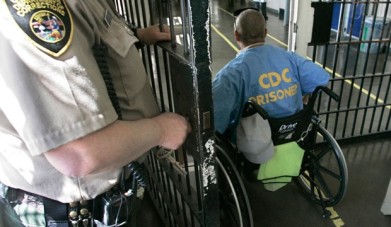This blog post will focus on existing legislation regulating prisoner health and wellness. The particular law that will be discussed is called Prisoner’s Rights Law. This law has various supplementary laws under it; however, the basic premise of this law is to make sure prisoners are maintaining their fundamental human rights as well as their civil liberties while behind bars in prisons and jails across the United States. This link provides a brief list of some of the laws that are in place under the Prisoner’s Rights Law: https://www.hg.org/prisoner-rights-law.html
 Although prisoners don’t have the same constitutional rights as the general population of the United States, they are still guaranteed these basic human and civil rights while incarcerated under the constitution. I will be discussing three components of laws under the Prisoner’s Rights Law and they deal with: sexual assault, disability, and medical and mental health care.
Although prisoners don’t have the same constitutional rights as the general population of the United States, they are still guaranteed these basic human and civil rights while incarcerated under the constitution. I will be discussing three components of laws under the Prisoner’s Rights Law and they deal with: sexual assault, disability, and medical and mental health care.
Sexual Assault
Inmates have the right to be free from any sexual assault while incarcerated. This can be from other inmates or prisoner personnel as well. Sexual assault is rampant across various prisons and jails in the United States. So even though this law is in place, it still doesn’t guarantee the safety of all inmates from sexual assault. According to the Bureau of Justice Statistics, roughly 4% of inmates reported being sexually assaulted in a 12-month period in 2011.
However, new information has been released since then, stating prison rape and sexual assault is highly underreported due to various influences such as: fear, pride, and mental status. Implementations such as video surveillance cameras, officer training programs, and encouragement to report sexual assaults are all positive ways to help both survivors and potential victims. While these implementations take time, money, and energy, they would be beneficial to many inmates. This video provides brief insight into prison rape culture and sexual assault:
Disability

This law entitles inmates with disabilities to reasonable accommodations, under the American with Disabilities Act (ADA), which ensures inmates can still access prison resources and facilities equally as their non-disabled counterparts can. According to the ADA, a disability is a “physical or mental impairment that substantially limits one or more of the major life activities of such individual; a record of such an impairment; or being regarded as having such an impairment.”
These laws protect disabled inmates from not receiving resources, care, or anything else they may need simply due to their disability status. Previously, before these types of laws were passed, inmates with disabilities could not partake in certain activities or have access to particular resources because they were disabled. This is obviously unconstitutional, which is why laws such as the ADA were passed.
Medical and Mental Health Care
All prisoners are entitled to receive medical care or mental health treatment as part of their basic fundamental human and civil rights. However, these treatments only need to be merely “adequate,” so if an inmate needs a higher level of care, he or she could possibly not receive it. It all depends on the prison level and resources given to that prison. This poses serious problems to prisons that are either underfunded or understaffed. This is a link to a great site with a lot of information regarding this topic: https://www.aclu.org/issues/prisoners-rights/medical-and-mental-health-care
In the past decade, far too many inmates have suffered due to a lack of medical or mental health care. This particularly applies to women, juveniles and older inmates, as they can be deemed the most vulnerable population. Before laws were passed that required adequate care for these inmates, it would have been very possible for an inmate to die from not receiving the proper health care. Tragedies like this can easily be avoided by giving inmates the proper resources to be medically and mentally stable. This law can also be categorized as a basic human right law for these inmates.
This video provides a brief insight into medical care in prison:
This link provides some of the stated laws under the Civil Rights of Institutionalized Persons Act: https://www.justice.gov/crt/civil-rights-institutionalized-persons
So, What Do You Think?
Has this blog post prompted any emotions or thoughts about inmate’s rights? Personally, I have become much more aware of how inmates are treated behind bars. In a way, I assumed they would be having basic human rights, but never did I think these rights were sometimes not met. I believe more needs to be done in order to ensure prisoner health rights and civil liberties.
There needs to be implementations in place that require prisons or jails to meet these minimum rights. I know it can be hard because the level of the prison facility directly dictates budget allowance and resources, but there needs to be a way for these inmates to still feel human. These rights are the only things some of the inmates have left. Without these rights ensured to them, the rest of the population is potentially dehumanizing these inmates.
If you have any thoughts on this particular topic, leave a comment!